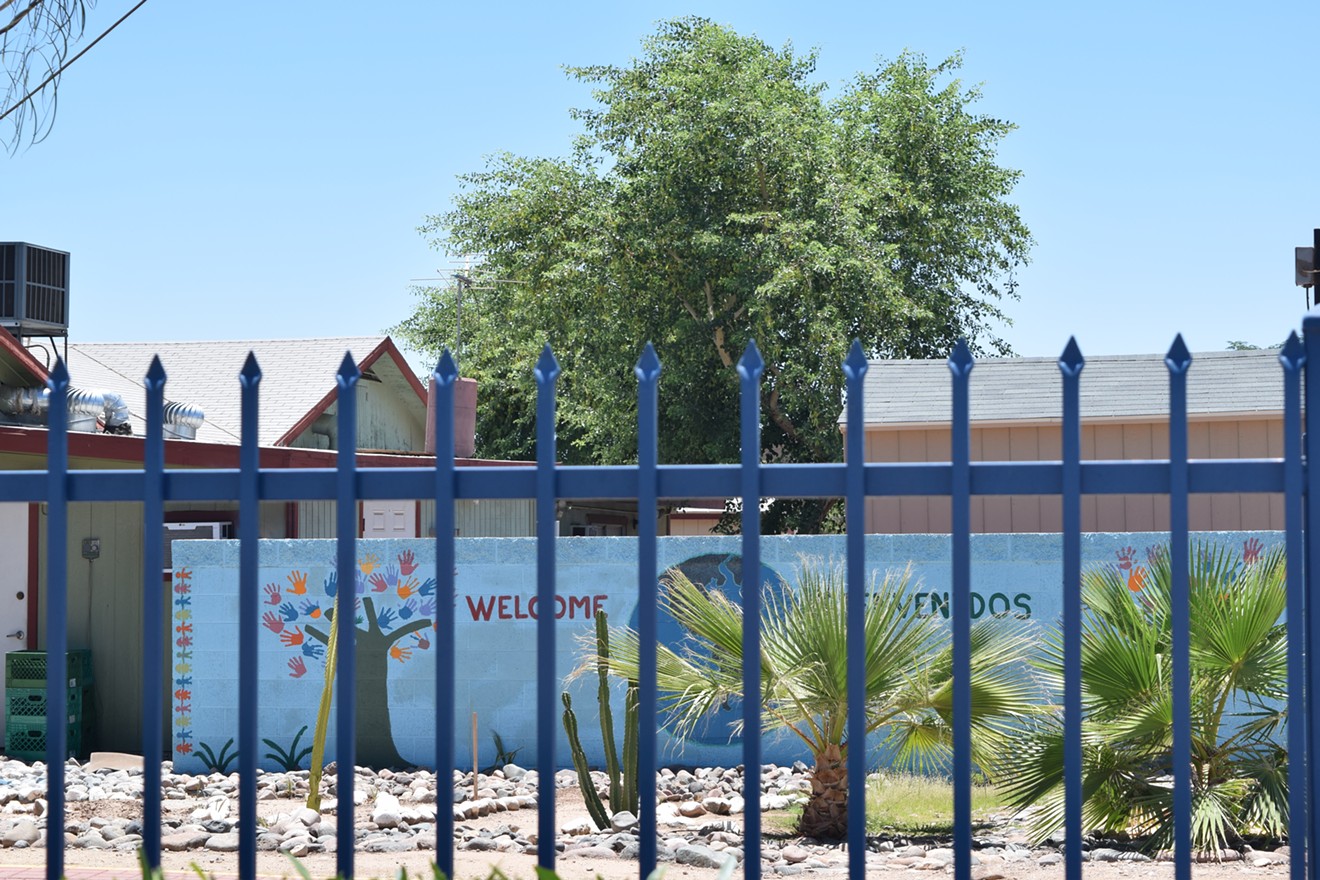The shelter in Glendale is one of around a dozen facilities in Arizona run by the nonprofit Southwest Key that has taken in immigrant youth under a Trump administration directive to separate families who cross the border.
In response to the investigation, the nonprofit removed a policy that said children could be restrained during an outburst — a policy that had violated an Arizona administrative code prohibition against restraining residents.
Another Southwest Key facility in Mesa was cited for not maintaining employee fingerprint records, which are used for criminal history checks of workers who deal with vulnerable populations. At several other metro Phoenix facilities, the nonprofit missed deadlines to reapply for a facility license.The policy also noted that restraints were not to last longer than five minutes, meaning the Christmas incident in 2016 was a double breach of the nonprofit's own procedure and of Arizona code.
tweet this
The past use of restraints by the nonprofit in Phoenix highlights how government contractors taking in immigrant youth need to be scrutinized.
Over 2,000 kids have been separated from their parents, and it's unclear how President Trump's executive order on Wednesday to detain families together will affect children caught in the "zero-tolerance" policy so far.
In February 2017, an investigator with the Arizona Department of Health Services evaluated a Southwest Key shelter in Glendale — a gated house on Myrtle Avenue that has a soccer net in the backyard. After reviewing medical records and video, the inspector discovered that a child was forcibly restrained for almost 40 minutes, in a clear violation of code.
In an incident on Christmas Day, according to the citation issued by ADHS, a minor "had been in a restraint for 21 minutes, released for a minute and then placed in another restraint for 16 minutes," per the report uncovered by the investigation.
Because the shelter is licensed as a behavioral-health residential facility, the use of restraints is not allowed under the Arizona Administrative Code.
The citation also notes, "A review of additional information gathered from staff documentation confirmed the time frames of the physical holds based on the video footage reviewed by the supervisor."
ADHS also discovered a Southwest Key email titled "Restraint Guidance" within the child's medical records. The email explained that restraints are to be reported to a "Restraint Review Committee."
"Ensure approved CPI [crisis prevention and intervention] techniques are applied and avoid using any other form of physical technique," the email said. "Advise staff members to release minor if the restraint is unsuccessful."
ADHS reported that this Southwest Key was operating under a policy document which said to "physically hold a client" to "safely manage" an incident and to prevent harm. According to the safety procedure, "an emergency safety response is used only in an emergency ... for the shortest possible duration of time needed to bring the client's behavior under control."
However, the policy also noted that restraints were not to last longer than five minutes, meaning the Christmas incident in 2016 was a double breach of the nonprofit's own procedure and of Arizona code.
As a result of the incident, Southwest Key removed the use of restraints from its emergency response procedures, according to the ADHS report. The nonprofit paid a penalty of $500 in May 2017 and submitted a corrective action plan.
Southwest Key also operates a shelter on Campbell Avenue in Phoenix. On Thursday, the combative attorney Michael Avenatti visited detained children at the shelter. Avenatti is fighting a legal battle against Trump on behalf of his client, the adult film actress Stormy Daniels. He announced that he is representing around 60 detained families and says he is working with whistleblowers within Immigration and Customs Enforcement.
Avenatti delivered a letter to a 6-year-old boy being held at the Campbell Avenue location after he was separated from his mother near Laredo, Texas. The attorney told reporters that 128 children are being held in the shelter, the "vast majority" of them kids who were recently separated from their parents.
Southwest Key has not disclosed how many children are being held in their Phoenix shelters.

A shelter for immigrant children on Campbell Avenue in Phoenix run by the government contractor Southwest Key.
Joseph Flaherty
As a New Times reporter was standing on the publicly accessible sidewalk beyond the fence that surrounds the property, an official with a badge on her hip approached the fence, where the reporter was holding a camera.
“Are you taking pictures?” she said. “If you don’t go, I’m going to call the police."
Based in Austin, Southwest Key has received over $1.5 billion over the past 10 years from the federal government for programs that serve migrant youth. The nonprofit's CEO, Juan Sanchez, was handsomely compensated in 2016 by nonprofit standards — he received $1.5 million in total compensation, a bump from his $786,000 the year before.
The nonprofit has programs in Arizona, Texas, California, Georgia, New York, Wisconsin, and Florida, according to its website.
At Southwest Key's Tucson facility, an employee named Antar Davidson quit last week, distressed over the state of the facility. He has since spoken out to criticize the nonprofit, telling the Los Angeles Times that the Tucson center is unprepared to deal with traumatized kids who have been separated from their parents. Southwest Key disputed Davidson's allegations.
The Texas Tribune and Reveal also reported this week that Texas inspectors discovered 246 violations at Southwest Key facilities in that state, including an employee who showed up drunk to work.
During the 2018 fiscal year, according to Bloomberg the government plans to pay Southwest Key more than $458 million to house detained migrant children in shelters. These new Southwest Key shelters will probably look more like the nonprofit's detention shelter in an abandoned Texas Walmart, where officials allowed reporters to enter last week.
Unlike that shelter, the Southwest Key facilities in metro Phoenix resemble schools or daycare centers. The nonprofit allowed a media tour of one of its Phoenix locations for the first time in 2016. At the time, 120 children were held at the facility following an influx of unaccompanied minors fleeing violence in Central America.
The federal Department of Health and Human Services is largely responsible for dealing with contractors like Southwest Key to house children who have crossed the border alone, or who have now been separated from their parents under the Trump administration's "zero tolerance" policy.
In addition to the Myrtle Avenue facility's penalty for restraining a child, other Southwest Key facilities in Arizona struggling to meet the deadlines for renewing their registrations with AZDHS.
Two Southwest Key facilities in Peoria plus another Southwest Key facility in Glendale paid a $250 fine for not meeting a deadline to reapply for a license 60 days before it expired.
And at a Mesa Southwest Key facility, the nonprofit paid $1,000 in October 2017 for failing to maintain adequate fingerprint records for three of five staff members. The Arizona Department of Public Safety uses these fingerprint cards to research the criminal histories of employees working with at-risk or vulnerable groups.
One employee at the Mesa facility did not submit fingerprints to DPS until 113 days after they were hired, according to the citation.
Five months later, the same facility in Mesa paid the $250 fine for not reapplying for a license before the 60-day deadline.
Nicole Capone, a spokesperson for ADHS, said that although the agency licenses a variety of facilities, they have no idea if a shelter is specifically housing immigrant minors who were apprehended after crossing the border.
“Any shelter that we license, there’s no subgroup that tells us who they’re hosting or necessarily what they’re doing," Capone told New Times. "So we don’t know which shelter houses who or what, so there’s no way for us to tell.”
ADHS does not have licensing authority for facilities under the direct control of federal agencies, she said.
Like other Southwest Key facilities, the Myrtle Avenue shelter is surrounded by a fence and has an automatic gate. An employee who answered the intercom at the gate declined to answer questions.
On a mural facing the road, there's a globe along with the words "Welcome" and "Bienvenidos," and two trees made out of paint handprints, in the style of an elementary-school art project. The dusty field in the backyard has a soccer net and a mural of the Virgin de Guadalupe.
Down the block from the Myrtle Avenue shelter, Alma Beltran was staying with her daughter, who she was visiting on a trip from her home in Chihuahua, Mexico.
She didn’t know much about the Southwest Key home, other than the fact that it was a youth care center. But Beltran said that on certain days of the week, lots of vehicles pull up to the house.
“I know that they take care of young people, that they treat them well,” Beltran said.












